Those problems vary from miscarriage,
sleeping difficulties to headache, backache…
Fortunately, they will be gone after
pregnancy. However, to reduce irresistible risks in pregnancy, everyone should
avoid those 10 following problems.
1. The risk of miscarriage
It often occurs from the 13th
week after the conception. So far, there has been no rule or specific benchmark
relating to the phenomenon. Everyone can have different ways but one reason
which is due the fact that abnormal chromosome cause damages on sperms.
Losing weight, pinky mucus discharge from
the vagina, severe back pain and bleeding black blood are common signs of
miscarriage.
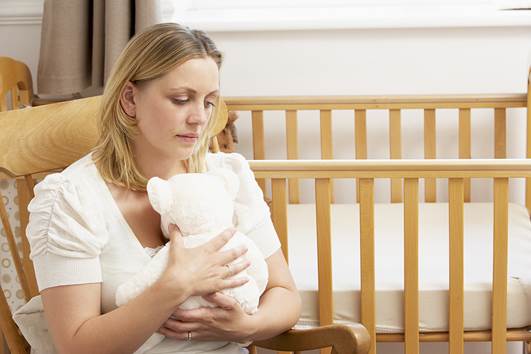
It
often occurs from the 13th week after the conception.
Methods
·
Take care of the diets, it’s necessary for you
to have a balanced diet, be provided with iron and folic acid to prevent anemia
which is a reason leading to malnutrition and miscarriage. You shouldn’t use
stimulants like alcohol, coffee and soft drinks especially in the first 3
months of pregnancy.
·
Avoid heavy activities.
·
Do recurring pregnancy test to detect abnormal
signs.
·
Maintain personal hygiene while having sex
because vaginal and uterine infections are reasons of miscarriage.
·
You shouldn’t use drugs without prescriptions
whether they are prescription drugs or non-prescription drugs.
·
According to the American Association of
Obstetrics, women who are 35-45 years old have the most chance of miscarriage,
so they should be careful in pregnancy.

Miscarriage
often happens in the first term of pregnancy.
2. Sleeping difficulties
Sleeping difficulties often occurs in the
last stage of pregnancy. In fact, the 3 first months of pregnancy, women often
spend more time sleeping, which considerably decreases in the last 3 months.
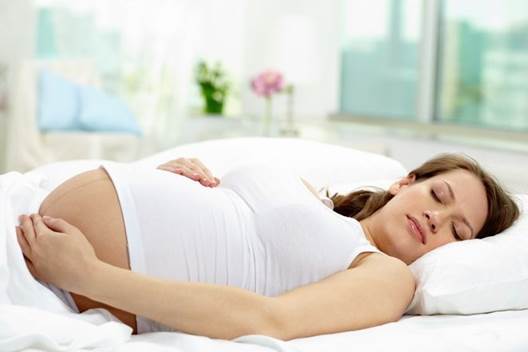
Sleeping
difficulties often occurs in the last stage of pregnancy.
It is usual because this is the time for
the placenta to form, which means the body has to provide more blood; the heart
has to work harder and pump blood faster. Those activities affect pregnant
women’s sleeps.
3. Ectopic pregnancy
Ectopic pregnancy is a common problem of
pregnant women who are over 35 years old. Common symptoms of the problem
include vaginal bleeding, cramps and fainting. In the worse situation, it can
lead to death. For that reason, when having any of those symptoms, pregnant
women have to see a doctor for consulting.
Methods
·
Control pregnancy, avoid unintended pregnancy
and abortions.
·
Take serious care of the hygiene of reproductive
organs, especially during period, after pregnancy or having sex. One of methods
that help married couples to prevent unintended pregnancy and inflammation is
using condoms.
·
If there’re signs of genitalia inflammations,
such as a great amount of discharge, itch and bad smell…, pregnant women have
to see a doctor soon.
·
Avoid staying in harmful environments,
contacting with tobacco smoke. Use safe products.
4. Carpal tunnel syndrome
This is a common disease in pregnant women.
The sign of it usually is the feeling of tingle. Nonetheless, the syndrome only
happens in the 4th-7th months of pregnancy and completely
disappears after pregnancy.
5. Gum bleeding
Gum bleeding is the result of hypertension.
The professionals recommend that pregnant women should maintain mouth hygiene
as they should brush teeth twice a day, one in the morning, another in the
evening. They should have balance, sensible diets that provide enough nutrients
to them or else. If the phenomenon gets worse, they should see the doctor and
ask for timely treatments.
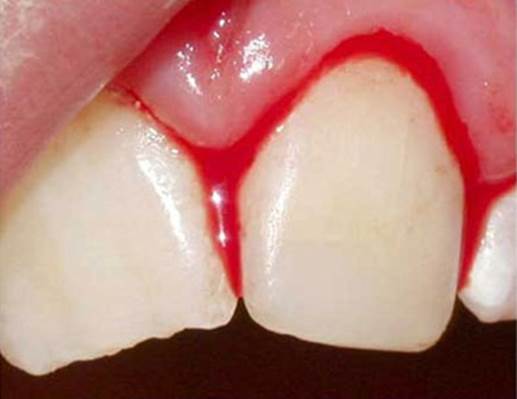
Gum
bleeding is the result of hypertension.
6. Urine infection
Urine infection or urinary tract infection
(UTI) is a popular disease in pregnant women. Its symptoms are easy to
recognize: it could be regular urinations and having sharp pain when urinating.
The reason of the disease is the existence of virus in vagina and straight
intestine.
There’re 3 types of infections in which the
cystitis is considered to be the most common. If the gestational urinary tract
infection isn’t cured, it can cause complications, such as low birth-weight and
the death of newborns.
7. Constipation
Constipation is one of popular sickness
during pregnancy and mainly due to hormone changing. In pregnancy, women’s
bodies have some changes.
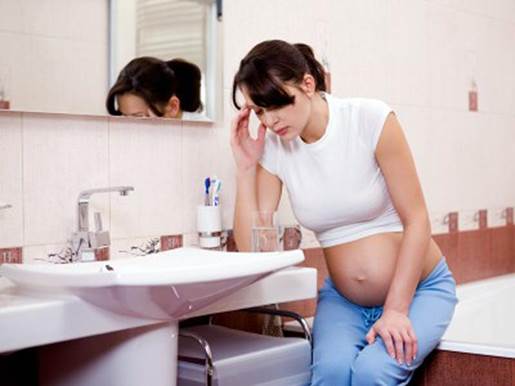
Constipation
is one of popular sickness during pregnancy.
The increase of hormones in pregnancy will
soften intestine muscle tissues and slow the moment of foods and cause lots of
fluctuations in which constipation is the most recognizable. Besides, the fact is
also due to diets and fetal developments.
Methods
·
Take care of diets, increase fiber supply by
eating a variety of foods, such as green vegetables (especially dark-green ones
like cauliflower, cabbage…) and cereal. Fibers will bring better digestion.
Avoid eating spicy foods.
·
Drink enough water: Providing enough water to
the body can help digestion work well, reduce constipation. In general, you
should drink 7-8 glasses of water.
·
Regular exercise: doing exercise at least 2-3
times a week and 20-30 minutes each.
8. Indigestion
Within constipation, indigestion is a
common disease of pregnant women. It often happens in the 3 last months and
come along with heartburn and nausea. This is a normal phenomenon that dues to
fetal developments and pressures caused by fetuses. All the problems will
reduce and completely disappear after pregnancy.
9. Varicose
Gestational varicose often rate 40% of
disease detection. It often occurs in legs and the vagina in the 3 last months
of pregnancy. There’re some recognizable symptoms such as leg cramps, heavy
legs, pain and discomfort.
Sometimes, it also causes sclerosis,
redness and formations of blood clots. The formation is also known as
thrombosis. The reasons of varicose are changes of sex hormones, genetic
factors and fetal effects.
Methods
Pregnant women should do more exercise,
maintain an active life, limit sitting, lying. They should do gentle work, wear
right-size slippers, avoid carrying heavy stuffs, sitting with crossed legs and
apply all sensible sleeping positions.
10. Headache
and backache
Headache and backache usually happen at the
same time in pregnancy, especially in the last months of pregnancy. There’re
many reasons of the diseases, such as the fact that fetal developments cause
body imbalances, hormone changing and other reasons that aren’t yet discovered.
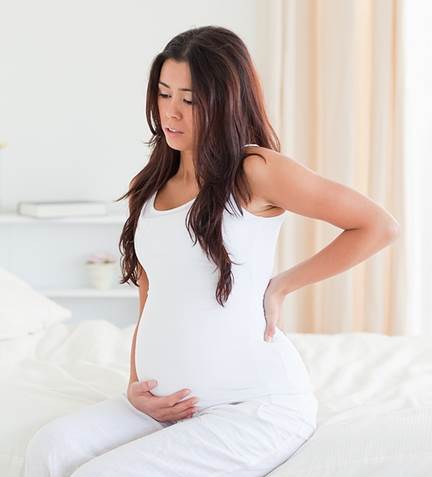
Backache
often occurs in the last months of pregnancy.
Headache can occur in the first months of
pregnancy because the spasm and expansion of brain blood vessels badly affect
blood circulation.
Methods
·
To backache:
Pregnant women should maintain suitable gaits, working, resting time and avoid
wearing high-heels. If possible, pregnant women should place hot or cold
pillows under the back.
·
To headache:
Pregnant women should limit using stimulants like coffee, alcohol, tobacco…
should have sensible, balanced diets, avoid working too hard, being under
pressure, staying up late and lacking sleep. They should their body warm in
winter, cool down the body when it’s summer.
If you have headache and backache happen at
the same time, you should follow the information and if the pain isn’t eased,
you should see a doctor.